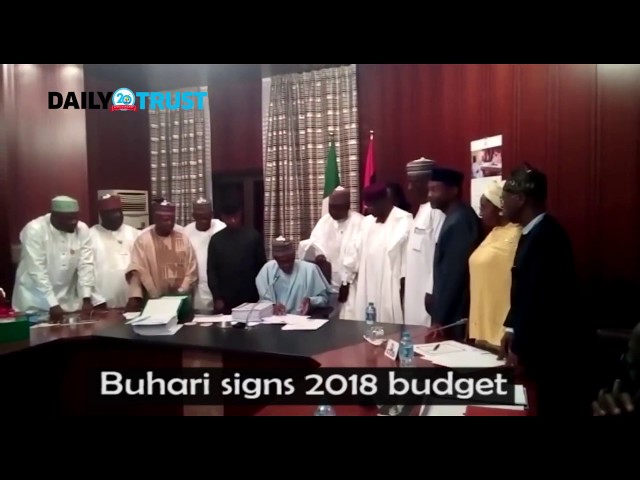
Finally, President Muhammadu Buhari has signed into law the 2018 appropriation bill, eight months after he submitted it to the National Assembly (NASS), which took seven months to play with it.
The executive arm then took another month, apparently scanning the document with a stethoscope. A stethoscope because at the event, last Wednesday, Mr. Buhari diagnosed mayhem: NASS had not only made 347bn Naira in cuts to 4,700 projects, it also introduced over 6,400 extraneous ones at a cost of 578bn Naira.
According to Buhari, and it is important to remember that the budget has only a few months to go, many of the projects cut are critical and may therefore “be difficult, if not impossible, to implement.”
He noted of the new projects, some “have not been properly conceptualised, designed and cost (sic) and will, therefore, be difficult to execute.”
He said many of the inserted projects were with no consideration for the institutional capacity of the relevant bodies to execute them or the incremental recurrent expenditure that may be required. About 70 new road projects, for instance, were inserted into the budget of the Federal Ministry of Power, Works and Housing.
And those projects affected by the massive cuts? To cite a few: the Mambilla Power Plant, Second Niger Bridge/ancillary roads, the East-West Road, Bonny-Bodo Road, Lagos-Ibadan Expressway, Itakpe-Ajaokuta Rail Project; ongoing critical infrastructure works in the FCT, including major roads and the mass transit rail project; the Maritime University in Delta State.
And then the National Assembly increased the provisions for Statutory Transfers by an aggregate of 73.96 billion Naira, Buhari lamented, mostly for recurrent expenditure.
“An example of this increase is the budget of the National Assembly itself which has increased by 14.5 billion Naira, from 125 billion Naira to 139.5 billion Naira without any discussion with the Executive,” Buhari said.
But take away the sugar-coating, and Buhari was telling Nigerians to expect nothing this year but another 10,000 in uncompleted projects for which he is not to blame.
To be sure, he did indicate he would plough ahead, but only if the legislature approves a forthcoming supplementary budget and requests to borrow.
For an administration that has made a living of complaining about the failings of its predecessor and the Peoples Democratic Party (PDP), as though that was not the very reason why Buhari was elected in the first place, last week’s events leave little room for optimism.
And now Buhari, eager to be re-elected next year, appears to have received the go-ahead to accomplish nothing but pay wages, allowances and estacodes.
But this is a self-inflicted injury. His signing of a bill for which he has so much disdain is the equivalent of singing a song of hope as you drink a fatal poison you helped brew.
And this is all because the president and his party, the All Progressives Congress (APC), are congenitally incapable of reading the tea leaves, and are bereft of the character to do the right thing.
How sad is this situation? Let us remember that both arms of the government, including the ‘saboteur’ NASS, belong to the APC.
NASS is not wrong to review and amend a budget proposal sent to it by the executive; that is a key part of its job. To that end, the first part of President Buhari’s complaints is self-serving.
Should NASS have reviewed the president’s proposals to the extent of savagely cutting funding for so many vital projects? Absolutely not.
And should the Assembly have replaced those projects with over 6400 projects at a value of nearly N600bn? Certainly not; but although that may be considered sabotage, the truth is that it reflects our broken leadership politics, through various fragments of the APC in Abuja.
If you paid attention to Buhari’s speech last week, you may have noticed the cynical single reference to Change. “I am sure you will remain committed to advancing our Change Agenda, not only in the preparation of the national budget but also in ensuring its effective implementation,” he said, evidently as an after-thought.
That is because “Change” has become difficult to reconcile with reality, and the scandalous budget now in place betrays every voter who trusted Buhari with the future.
The truth is that the division between Buhari and the legislators on this matter says far more about Buhari’s incompetence and lack of national respect than it says about the NASS.
It is funny that the president acts surprised when the budget returns to him and it is significantly different. But sending the appropriation bill or any other to the legislature does not mean you go to bed. They may be mainly of your party, they don’t owe you anything, particularly in an everyman-for-himself buffet such as our governance in Nigeria.
In the end, this budget mostly reflects Buhari’s failure to make an impact on Nigeria at the most important level: the philosophical.
As I have written previously, the only genuine impact Buhari can make on Nigeria is not this annual ritual of thousands of projects, but the broadening of the base of political competition so that more committed Nigerians can run for office. Over time, that would have the effect of getting into the public conversation people who can see beyond themselves; and getting elected higher numbers of people who want to serve, not steal.
One strategy here, particularly with the APC in power, is to aim at improving the legislative demographic in the short term. He can do this by proposing a constitutional amendment whereby governors and their deputies, when they are out of office, skip one electoral cycle (if they served one term) or two (if they served two terms) before they can run for higher office.
That will prevent serving governors from using state governorships first to enrich themselves, and then to convert into Senators, and give opportunities in the federal legislature to other people transiting governors tend to frustrate or overpower. In some cases, it would also give the anti-corruption agencies easy access to those of them who may have questions to answer, having lost their immunity.
I have also previously written, in this connection, of changes Buhari can champion on the campaign finance issue, as well as on the electoral law, to provide a level playing field and attract competent and patriotic Nigerians to run for public office.
Unless Mr. Buhari can commit himself to such fundamental changes, he is wasting time in Aso Rock and can make no impact even if he spends 40 years there.
The budget game every year-from padding within the executive to gerrymandering and blackmail in the legislature-is but a symptom of a bigger disease. If Buhari does not address that disease, he is a part of the game.
• @Sonala.Olumhense

 Join Daily Trust WhatsApp Community For Quick Access To News and Happenings Around You.
Join Daily Trust WhatsApp Community For Quick Access To News and Happenings Around You.

